- Home
- Beverly Cleary
Ramona the Pest
Ramona the Pest Read online
Beverly Cleary
Ramona the Pest
Illustrated by
Tracy Dockray
Contents
1. Ramona's Great Day
2. Show and Tell
3. Seat Work
4. The Substitute
5. Ramona's Engagement Ring
6. The Baddest Witch in the World
7. The Day Things Went Wrong
8. Kindergarten Dropout
About the Author
Other Books by Beverly Cleary
Credits
Copyright
About the Publisher
1
Ramona’s Great Day
“I am not a pest,” Ramona Quimby told her big sister Beezus.
“Then stop acting like a pest,” said Beezus, whose real name was Beatrice. She was standing by the front window waiting for her friend Mary Jane to walk to school with her.
“I’m not acting like a pest. I’m singing and skipping,” said Ramona, who had only recently learned to skip with both feet. Ramona did not think she was a pest. No matter what others said, she never thought she was a pest. The people who called her a pest were always bigger and so they could be unfair.
Ramona went on with her singing and skipping. “This is a great day, a great day, a great day!” she sang, and to Ramona, who was feeling grown up in a dress instead of play clothes, this was a great day, the greatest day of her whole life. No longer would she have to sit on her tricycle watching Beezus and Henry Huggins and the rest of the boys and girls in the neighborhood go off to school. Today she was going to school, too. Today she was going to learn to read and write and do all the things that would help her catch up with Beezus.
“Come on, Mama!” urged Ramona, pausing in her singing and skipping. “We don’t want to be late for school.”
“Don’t pester, Ramona,” said Mrs. Quimby. “I’ll get you there in plenty of time.”
“I’m not pestering,” protested Ramona, who never meant to pester. She was not a slowpoke grown-up. She was a girl who could not wait. Life was so interesting she had to find out what happened next.
Then Mary Jane arrived. “Mrs. Quimby, would it be all right if Beezus and I take Ramona to kindergarten?” she asked.
“No!” said Ramona instantly. Mary Jane was one of those girls who always wanted to pretend she was a mother and who always wanted Ramona to be the baby. Nobody was going to catch Ramona being a baby on her first day of school.
“Why not?” Mrs. Quimby asked Ramona. “You could walk to school with Beezus and Mary Jane just like a big girl.”
“No, I couldn’t.” Ramona was not fooled for an instant. Mary Jane would talk in that silly voice she used when she was being a mother and take her by the hand and help her across the street, and everyone would think she really was a baby.
“Please, Ramona,” coaxed Beezus. “It would be lots of fun to take you in and introduce you to the kindergarten teacher.”
“No!” said Ramona, and stamped her foot. Beezus and Mary Jane might have fun, but she wouldn’t. Nobody but a genuine grown-up was going to take her to school. If she had to, she would make a great big noisy fuss, and when Ramona made a great big noisy fuss, she usually got her own way. Great big noisy fusses were often necessary when a girl was the youngest member of the family and the youngest person on her block.
“All right, Ramona,” said Mrs. Quimby. “Don’t make a great big noisy fuss. If that’s the way you feel about it, you don’t have to walk with the girls. I’ll take you.”
“Hurry, Mama,” said Ramona happily, as she watched Beezus and Mary Jane go out the door. But when Ramona finally got her mother out of the house, she was disappointed to see one of her mother’s friends, Mrs. Kemp, approaching with her son Howie and his little sister Willa Jean, who was riding in a stroller. “Hurry, Mama,” urged Ramona, not wanting to wait for the Kemps. Because their mothers were friends, she and Howie were expected to get along with one another.
“Hi, there!” Mrs. Kemp called out, so of course Ramona’s mother had to wait.
Howie stared at Ramona. He did not like having to get along with her any more than she liked having to get along with him.
Ramona stared back. Howie was a solid-looking boy with curly blond hair. (“Such a waste on a boy,” his mother often remarked.) The legs of his new jeans were turned up, and he was wearing a new shirt with long sleeves. He did not look the least bit excited about starting kindergarten. That was the trouble with Howie, Ramona felt. He never got excited. Straight-haired Willa Jean, who was interesting to Ramona because she was so sloppy, blew out a mouthful of wet zwieback crumbs and laughed at her cleverness.
“Today my baby leaves me,” remarked Mrs. Quimby with a smile, as the little group proceeded down Klickitat Street toward Glenwood School.
Ramona, who enjoyed being her mother’s baby, did not enjoy being called her mother’s baby, especially in front of Howie.
“They grow up quickly,” observed Mrs. Kemp.
Ramona could not understand why grown-ups always talked about how quickly children grew up. Ramona thought growing up was the slowest thing there was, slower even than waiting for Christmas to come. She had been waiting years just to get to kindergarten, and the last half hour was the slowest part of all.
When the group reached the intersection nearest Glenwood School, Ramona was pleased to see that Beezus’s friend Henry Huggins was the traffic boy in charge of that particular corner. After Henry had led them across the street, Ramona ran off toward the kindergarten, which was a temporary wooden building with its own playground. Mothers and children were already entering the open door. Some of the children looked frightened, and one girl was crying.
“We’re late!” cried Ramona. “Hurry!”
Howie was not a boy to be hurried. “I don’t see any tricycles,” he said critically. “I don’t see any dirt to dig in.”
Ramona was scornful. “This isn’t nursery school. Tricycles and dirt are for nursery school.” Her own tricycle was hidden in the garage, because it was too babyish for her now that she was going to school.
Some big first-grade boys ran past yelling, “Kindergarten babies! Kindergarten babies!”
“We are not babies!” Ramona yelled back, as she led her mother into the kindergarten. Once inside she stayed close to her. Everything was so strange, and there was so much to see: the little tables and chairs; the row of cupboards, each with a different picture on the door; the play stove; and the wooden blocks big enough to stand on.
The teacher, who was new to Glenwood School, turned out to be so young and pretty she could not have been a grown-up very long. It was rumored she had never taught school before. “Hello, Ramona. My name is Miss Binney,” she said, speaking each syllable distinctly as she pinned Ramona’s name to her dress. “I am so glad you have come to kindergarten.” Then she took Ramona by the hand and led her to one of the little tables and chairs. “Sit here for the present,” she said with a smile.
A present! thought Ramona, and knew at once she was going to like Miss Binney.
“Good-by, Ramona,” said Mrs. Quimby. “Be a good girl.”
As she watched her mother walk out the door, Ramona decided school was going to be even better than she had hoped. Nobody had told her she was going to get a present the very first day. What kind of present could it be, she wondered, trying to remember if Beezus had ever been given a present by her teacher.
Ramona listened carefully while Miss Binney showed Howie to a table, but all her teacher said was, “Howie, I would like you to sit here.” Well! thought Ramona. Not everyone is going to get a present so Miss Binney must like me best. Ramona watched and listened as the other boys and girls arrived, but Miss Binney did not tell anyone else he
was going to get a present if he sat in a certain chair. Ramona wondered if her present would be wrapped in fancy paper and tied with a ribbon like a birthday present. She hoped so.
As Ramona sat waiting for her present she watched the other children being introduced to Miss Binney by their mothers. She found two members of the morning kindergarten especially interesting. One was a boy named Davy, who was small, thin, and eager. He was the only boy in the class in short pants, and Ramona liked him at once. She liked him so much she decided she would like to kiss him.
The other interesting person was a big girl named Susan. Susan’s hair looked like the hair on the girls in the pictures of the old-fashioned stories Beezus liked to read. It was reddish-brown and hung in curls like springs that touched her shoulders and bounced as she walked. Ramona had never seen such curls before. All the curly-haired girls she knew wore their hair short. Ramona put her hand to her own short straight hair, which was an ordinary brown, and longed to touch that bright springy hair. She longed to stretch one of those curls and watch it spring back. Boing! thought Ramona, making a mental noise like a spring on a television cartoon and wishing for thick, springy boing-boing hair like Susan’s.
Howie interrupted Ramona’s admiration of Susan’s hair. “How soon do you think we get to go out and play?” he asked.
“Maybe after Miss Binney gives me the present,” Ramona answered. “She said she was going to give me one.”
“How come she’s going to give you a present?” Howie wanted to know. “She didn’t say anything about giving me a present.”
“Maybe she likes me best,” said Ramona.
This news did not make Howie happy. He turned to the next boy, and said, “She’s going to get a present.”
Ramona wondered how long she would have to sit there to get the present. If only Miss Binney understood how hard waiting was for her! When the last child had been welcomed and the last tearful mother had departed, Miss Binney gave a little talk about the rules of the kindergarten and showed the class the door that led to the bathroom. Next she assigned each person a little cupboard. Ramona’s cupboard had a picture of a yellow duck on the door, and Howie’s had a green frog. Miss Binney explained that their hooks in the cloakroom were marked with the same pictures. Then she asked the class to follow her quietly into the cloakroom to find their hooks.
Difficult though waiting was for her, Ramona did not budge. Miss Binney had not told her to get up and go into the cloakroom for her present. She had told her to sit for the present, and Ramona was going to sit until she got it. She would sit as if she were glued to the chair.
Howie scowled at Ramona as he returned from the cloakroom, and said to another boy, “The teacher is going to give her a present.”
Naturally the boy wanted to know why. “I don’t know,” admitted Ramona. “She told me that if I sat here I would get a present. I guess she likes me best.”
By the time Miss Binney returned from the cloakroom, word had spread around the classroom that Ramona was going to get a present.
Next Miss Binney taught the class the words of a puzzling song about “the dawnzer lee light,” which Ramona did not understand because she did not know what a dawnzer was. “Oh, say, can you see by the dawnzer lee light,” sang Miss Binney, and Ramona decided that a dawnzer was another word for a lamp.
When Miss Binney had gone over the song several times, she asked the class to stand and sing it with her. Ramona did not budge. Neither did Howie and some of the others, and Ramona knew they were hoping for a present, too. Copycats, she thought.
“Stand up straight like good Americans,” said Miss Binney so firmly that Howie and the others reluctantly stood up.
Ramona decided she would have to be a good American sitting down.
“Ramona,” said Miss Binney, “aren’t you going to stand with the rest of us?”
Ramona thought quickly. Maybe the question was some kind of test, like a test in a fairy tale. Maybe Miss Binney was testing her to see if she could get her out of her seat. If she failed the test, she would not get the present.
“I can’t,” said Ramona.
Miss Binney looked puzzled, but she did not insist that Ramona stand while she led the class through the dawnzer song. Ramona sang along with the others and hoped that her present came next, but when the song ended, Miss Binney made no mention of the present. Instead she picked up a book. Ramona decided that at last the time had come to learn to read.
Miss Binney stood in front of her class and began to read aloud from Mike Mulligan and His Steam Shovel, a book that was a favorite of Ramona’s because, unlike so many books for her age, it was neither quiet and sleepy nor sweet and pretty. Ramona, pretending she was glued to her chair, enjoyed hearing the story again and listened quietly with the rest of the kindergarten to the story of Mike Mulligan’s old-fashioned steam shovel, which proved its worth by digging the basement for the new town hall of Poppersville in a single day beginning at dawn and ending as the sun went down.
As Ramona listened a question came into her mind, a question that had often puzzled her about the books that were read to her. Somehow books always left out one of the most important things anyone would want to know. Now that Ramona was in school, and school was a place for learning, perhaps Miss Binney could answer the question. Ramona waited quietly until her teacher had finished the story, and then she raised her hand the way Miss Binney had told the class they should raise their hands when they wanted to speak in school.
Joey, who did not remember to raise his hand, spoke out. “That’s a good book.”
Miss Binney smiled at Ramona, and said, “I like the way Ramona remembers to raise her hand when she has something to say. Yes, Ramona?”
Ramona’s hopes soared. Her teacher had smiled at her. “Miss Binney, I want to know—how did Mike Mulligan go to the bathroom when he was digging the basement of the town hall?”
Miss Binney’s smile seemed to last longer than smiles usually last. Ramona glanced uneasily around and saw that others were waiting with interest for the answer. Everybody wanted to know how Mike Mulligan went to the bathroom.
“Well—” said Miss Binney at last. “I don’t really know, Ramona. The book doesn’t tell us.”
“I always wanted to know, too,” said Howie, without raising his hand, and others murmured in agreement. The whole class, it seemed, had been wondering how Mike Mulligan went to the bathroom.
“Maybe he stopped the steam shovel and climbed out of the hole he was digging and went to a service station,” suggested a boy named Eric.
“He couldn’t. The book says he had to work as fast as he could all day,” Howie pointed out. “It doesn’t say he stopped.”
Miss Binney faced the twenty-nine earnest members of the kindergarten, all of whom wanted to know how Mike Mulligan went to the bathroom.
“Boys and girls,” she began, and spoke in her clear, distinct way. “The reason the book does not tell us how Mike Mulligan went to the bathroom is that it is not an important part of the story. The story is about digging the basement of the town hall, and that is what the book tells us.”
Miss Binney spoke as if this explanation ended the matter, but the kindergarten was not convinced. Ramona knew and the rest of the class knew that knowing how to go to the bathroom was important. They were surprised that Miss Binney did not understand, because she had showed them the bathroom the very first thing. Ramona could see there were some things she was not going to learn in school, and along with the rest of the class she stared reproachfully at Miss Binney.
The teacher looked embarrassed, as if she knew she had disappointed her kindergarten. She recovered quickly, closed the book, and told the class that if they would walk quietly out to the playground she would teach them a game called Gray Duck.
Ramona did not budge. She watched the rest of the class leave the room and admired Susan’s boing-boing curls as they bounced about her shoulders, but she did not stir from her seat. Only Miss Binney could unstick the
imaginary glue that held her there.
“Don’t you want to learn to play Gray Duck, Ramona?” Miss Binney asked.
Ramona nodded. “Yes, but I can’t.”
“Why not?” asked Miss Binney.
“I can’t leave my seat,” said Ramona. When Miss Binney looked blank, she added, “Because of the present.”
“What present?” Miss Binney seemed so genuinely puzzled that Ramona became uneasy. The teacher sat down in the little chair next to Ramona’s, and said, “Tell me why you can’t play Gray Duck.”
Ramona squirmed, worn out with waiting. She had an uneasy feeling that something had gone wrong someplace. “I want to play Gray Duck, but you—” she stopped, feeling that she might be about to say the wrong thing.
“But I what?” asked Miss Binney.
“Well…uh…you said if I sat here I would get a present,” said Ramona at last, “but you didn’t say how long I had to sit here.”
If Miss Binney had looked puzzled before, she now looked baffled. “Ramona, I don’t understand—” she began.
“Yes, you did,” said Ramona, nodding. “You told me to sit here for the present, and I have been sitting here ever since school started and you haven’t given me a present.”
Miss Binney’s face turned red and she looked so embarrassed that Ramona felt completely confused. Teachers were not supposed to look that way.
Miss Binney spoke gently. “Ramona, I’m afraid we’ve had a misunderstanding.”
Ramona was blunt. “You mean I don’t get a present?”
“I’m afraid not,” admitted Miss Binney. “You see ‘for the present’ means for now. I meant that I wanted you to sit here for now, because later I may have the children sit at different desks.”
“Oh.” Ramona was so disappointed she had nothing to say. Words were so puzzling. Present should mean a present just as attack should mean to stick tacks in people.

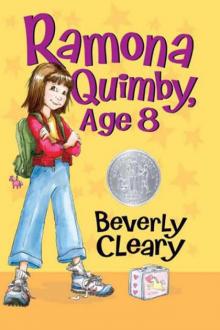 Ramona Quimby, Age 8
Ramona Quimby, Age 8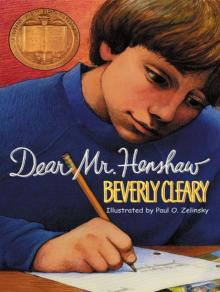 Dear Mr. Henshaw
Dear Mr. Henshaw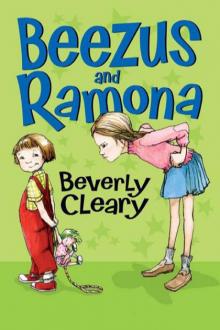 Beezus and Ramona
Beezus and Ramona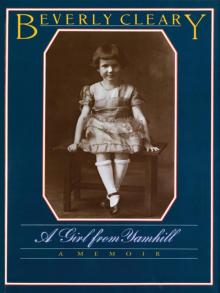 A Girl from Yamhill
A Girl from Yamhill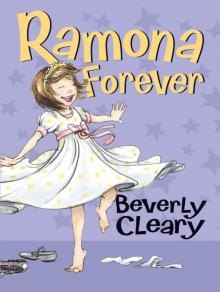 Ramona Forever
Ramona Forever Jean and Johnny
Jean and Johnny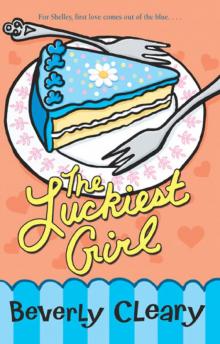 The Luckiest Girl
The Luckiest Girl Emily's Runaway Imagination
Emily's Runaway Imagination Ribsy
Ribsy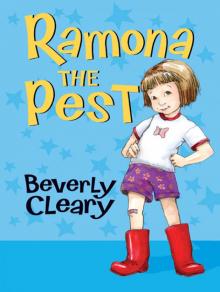 Ramona the Pest
Ramona the Pest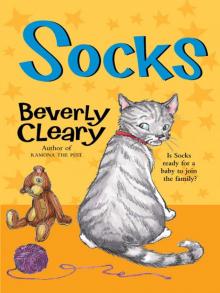 Socks
Socks Ramona's World
Ramona's World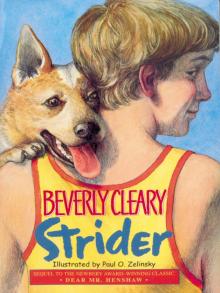 Strider
Strider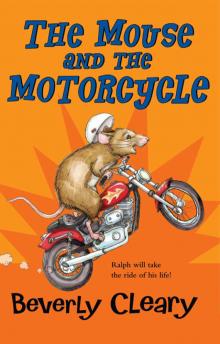 The Mouse and the Motorcycle
The Mouse and the Motorcycle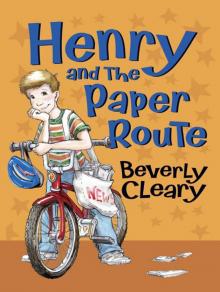 Henry and the Paper Route
Henry and the Paper Route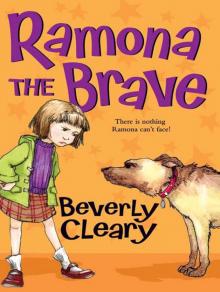 Ramona the Brave
Ramona the Brave Henry Huggins
Henry Huggins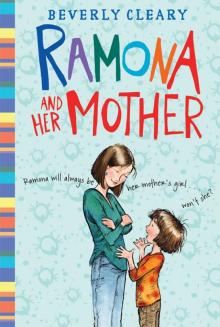 Ramona and Her Mother
Ramona and Her Mother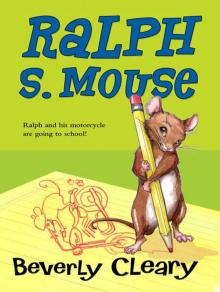 Ralph S. Mouse
Ralph S. Mouse Sister of the Bride
Sister of the Bride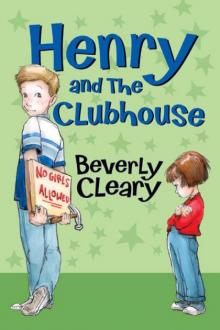 Henry and the Clubhouse
Henry and the Clubhouse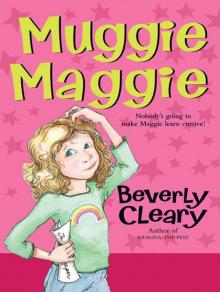 Muggie Maggie
Muggie Maggie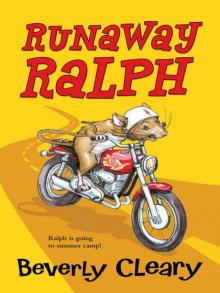 Runaway Ralph
Runaway Ralph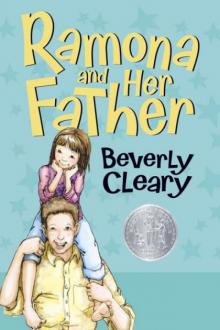 Ramona and Her Father
Ramona and Her Father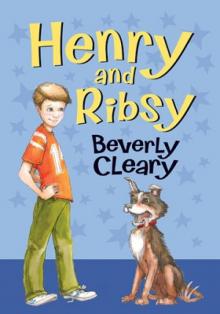 Henry and Ribsy
Henry and Ribsy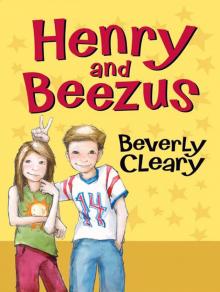 Henry and Beezus
Henry and Beezus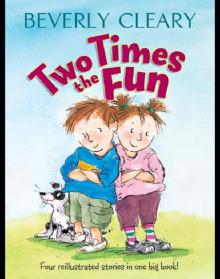 Two Times the Fun
Two Times the Fun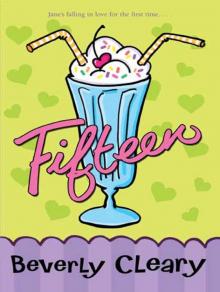 Fifteen
Fifteen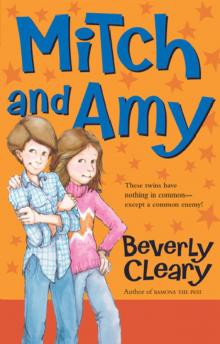 Mitch and Amy
Mitch and Amy